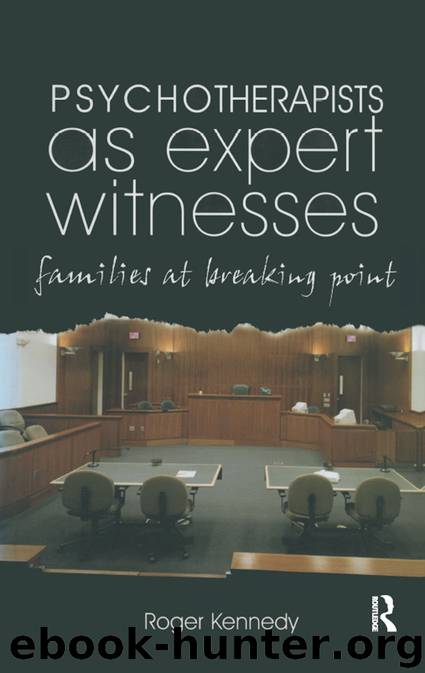Psychotherapists As Expert Witnesses by Kennedy Roger;

Author:Kennedy, Roger;
Language: eng
Format: epub
Publisher: Routledge
CHAPTER FIVE
Rehabilitation issues: remove children or keep them with their parents?
General points
Deciding whether or not a child should be removed from their parents, or deciding that an attempt should be made to return them once they have been removed, can be one of the most difficult and complex decisions facing the professionals working with children and families. For this reason, assessment of such families should usually be undertaken within a multi-disciplinary team, where different views can contribute to the clinical picture and extensive discussion of issues can take place. A single jointly instructed expert can have a role in looking at a complex situation as an outsider. They may be able to look at the papers and give some guidelines about how to proceed and the potential prospects for rehabilitation. Or they may see the parents as a preliminary to a more extensive assessment, either to rule out the possibility of rehabilitation if the parents are, for example, devoid of insight, or, on the contrary, display a willingness and ability to be assessed fully. But it is difficult to give a final view about the prospects for rehabilitation without a comprehensive multidisciplinary assessment.
The kinds of families for whom there is the issue of whether or not to proceed with rehabilitation are often disturbed, and also cause considerable disturbance in their professional network. Large amounts of anxiety, splitting between workers, and disputes about what should happen are common with the workers, and this may lead to reflex responses rather than measured action, or else paralysis and drift, with undue delay in making appropriate decisions. The examples from this chapter are taken from work with such disturbed families at the Cassel Hospital, a centre of excellence for the psychotherapeutic treatment of families, adolescents and adults.
The family service at the Cassel Hospital provides out-patient, day patient and residential facilities to assess and, where possible, treat multi-problem families from the whole country. The service has built up extensive experience of undertaking the arduous and sometimes nerve-racking task of rehabilitating families for which other forms of treatment have failed, been insufficient, or lacking. The Cassel approach is from an “applied” psychoanalytical viewpoint, which looks at unconscious factors in the individual and their family, but also takes account of the family’s day-to-day behaviour and whole ways of relating, as will be illustrated in the examples in this chapter.
As I have already indicated elsewhere (Kennedy, 1997b), there are three essential questions that are raised time and again when making family assessments of problem families, where the issue of whether or not the child should remain with their parents is the main one.
• What is the ability of the parents in question to look after their child?
• Are the children safe with their parents?
• Should the family be given a chance to stay together, despite major problems, and when should rehabilitation be abandoned or not even attempted?
A thorough assessment of parenting capacities is the basis for providing answers about questions of children’s safety and the chances of a successful rehabilitation outcome.
Download
This site does not store any files on its server. We only index and link to content provided by other sites. Please contact the content providers to delete copyright contents if any and email us, we'll remove relevant links or contents immediately.
Should I Stay or Should I Go? by Ramani Durvasula(7667)
Why We Sleep: Unlocking the Power of Sleep and Dreams by Matthew Walker(6720)
Fear by Osho(4734)
Flow by Mihaly Csikszentmihalyi(4697)
Rising Strong by Brene Brown(4459)
Why We Sleep by Matthew Walker(4440)
The Hacking of the American Mind by Robert H. Lustig(4381)
How to Change Your Mind by Michael Pollan(4356)
Too Much and Not the Mood by Durga Chew-Bose(4345)
Lost Connections by Johann Hari(4183)
He's Just Not That Into You by Greg Behrendt & Liz Tuccillo(3900)
Evolve Your Brain by Joe Dispenza(3677)
The Courage to Be Disliked by Ichiro Kishimi & Fumitake Koga(3503)
Crazy Is My Superpower by A.J. Mendez Brooks(3400)
In Cold Blood by Truman Capote(3384)
Resisting Happiness by Matthew Kelly(3340)
What If This Were Enough? by Heather Havrilesky(3311)
The Book of Human Emotions by Tiffany Watt Smith(3309)
Descartes' Error by Antonio Damasio(3277)
